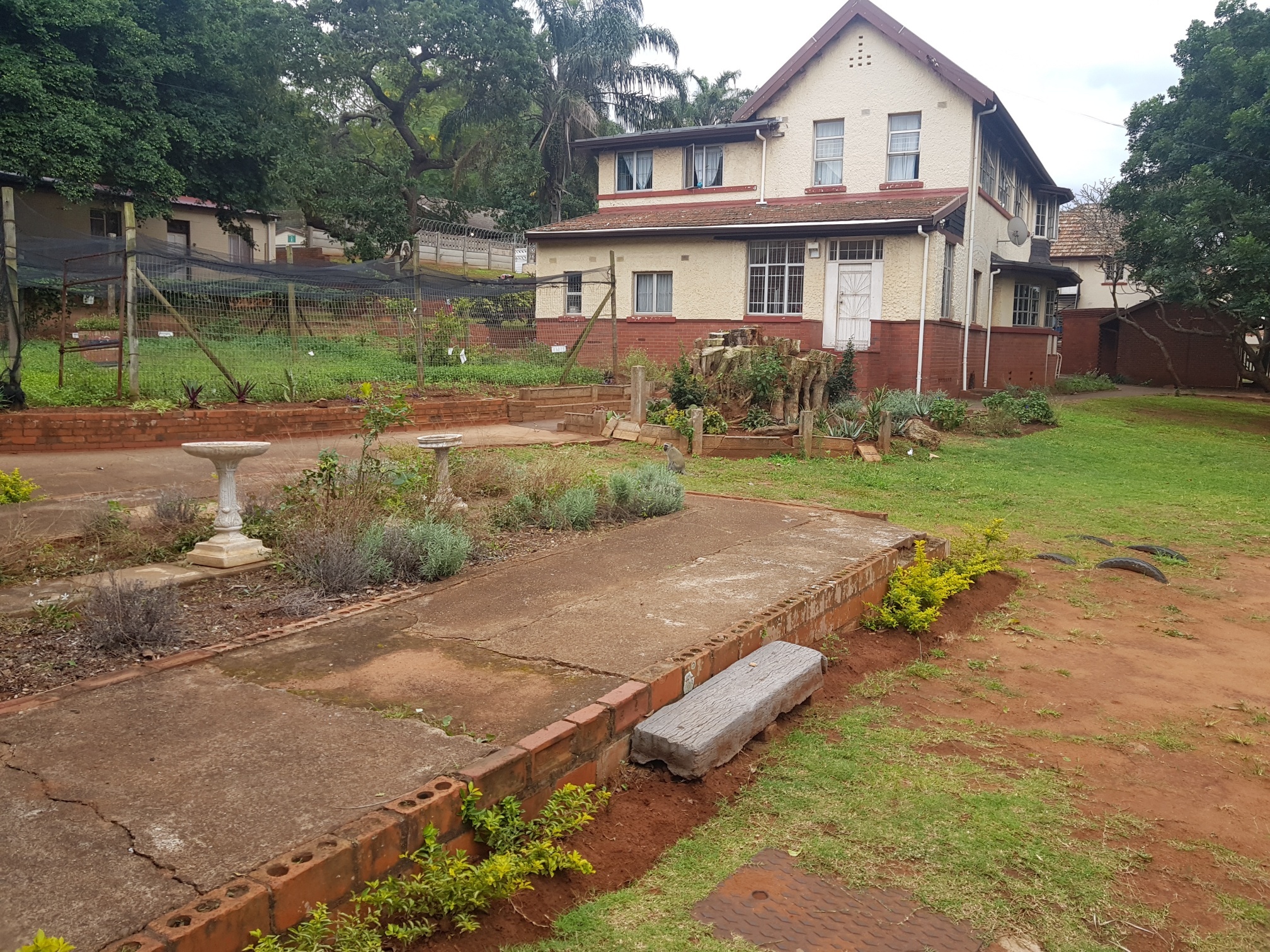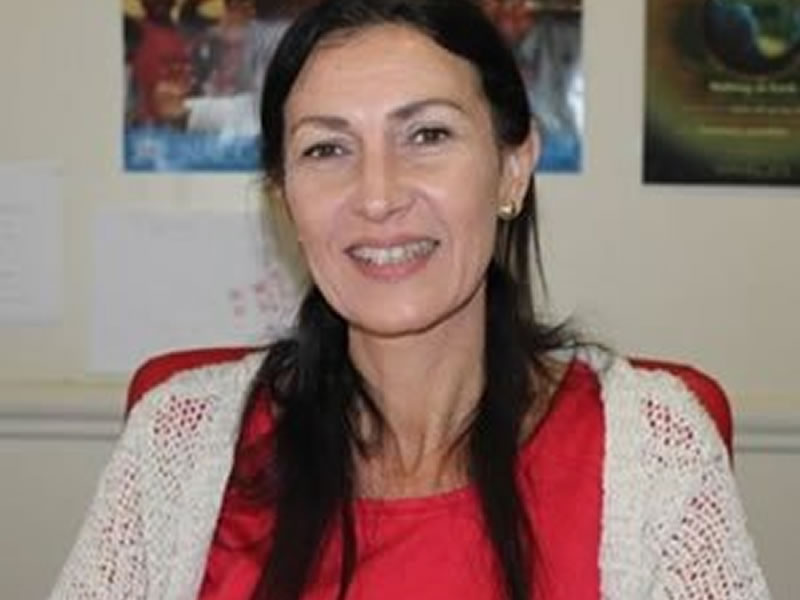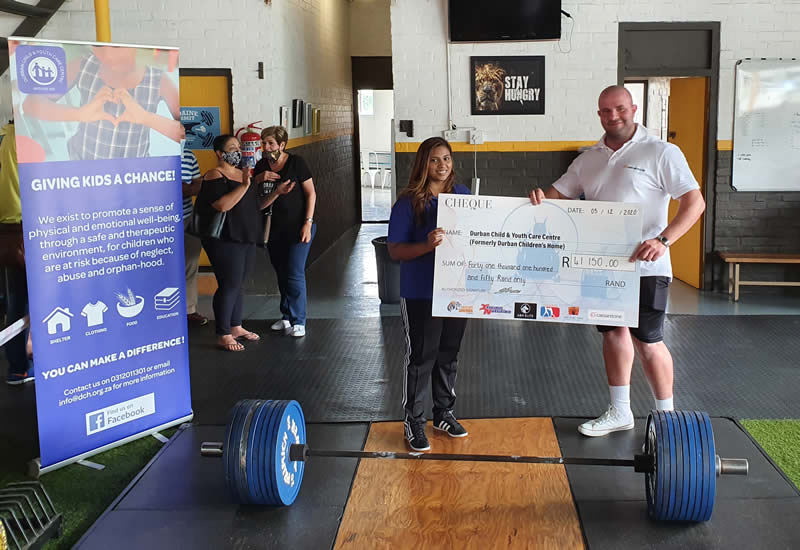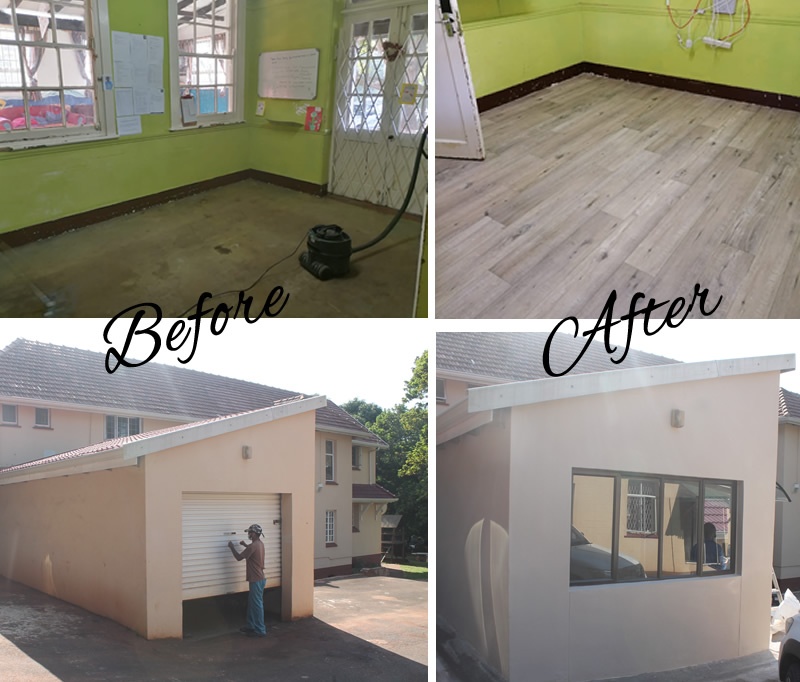
Jun 17, 2021 | News

Most households will understand the importance of a tumble dryer, especially in winter when the sun just doesn’t have the power to get all the clothes, bedding and towels dry quickly enough. With 74 children in our care, you can imagine what our laundry baskets look like!
So, when our tumble dryer finally packed up after many, many years of service we were distraught. The cost of getting it fixed was the same as a brand new machine … both options requiring finances we simply don’t have available.
We were so relieved when Pinnacle Human Capital Consulting contacted us to offer their support. Thanks to their generosity, we now have a brand new tumble dryer, which is already working hard to ensure the children have clean dry laundry every day.
Thank you Pinnacle Human Capital Consulting!

Jun 17, 2021 | News

Lindsay Hamilton and her friend Megan Howes, an independent garden designer, have made magic happen!
When Lindsay offered to take on the landscaping of our gardens at 222 Lena Ahrens Road, never in our wildest dreams could we have imagined the beautiful garden spaces that have started to take root. For many years to come, the garden will be an oasis, where children’s imagination and play can run free.
As incredible as this gift is, Lindsay’s generosity doesn’t stop there. When Saunders House underwent a complete renovation a few years back, the budget just didn’t stretch to cover curtains. Lindsay was only to happy to add this project to her contribution. Thanks to her, the boys and girls in Saunders House can draw curtains as soon as it starts to get dark, and now feel safe and cosy at night.
Lindsay is one of those rare people who offer to serve with a humility that is inspiring; thank you so much, Lindsay!

Jun 17, 2021 | News
Is it just me or does it feel like the days of each week are like beach sand, sifting through one’s fingers? Here we are approaching the middle of the year, a year that has been nowhere near the normal we once took for granted.
With most state schools functioning with 50% of children at a time, our programme is a buzz with children 24/7. Our child and youth care team revised the daily programme designed for last year, ensuring that our children have a daily structure that provides a healthy rhythm for them to follow.
A balance between academic work, developmental activities, and fun time is crucial to maintain an environment which is encouraging and optimistic. And let us be honest, we have all needed a dose of optimism.
As the lockdown eased, some normality returned to the children’s lives. A visit to the beach was top of the list and the children enjoyed every moment of the freedom to run wildly across the sand and jump into the waves. With the wheels of the welfare system starting to churn again, our social workers were able to draw in family so that the critical task of reunification could be re-initiated.
With the return to Level 3 restrictions as we ride the 3rd wave, the only thing we know for certain is that nothing is certain! However, we forge ahead with faith.
Our friends and donors have been remarkable. You have not faltered in your support and we cannot begin to tell you how incredibly grateful we are.
Apart from financial support towards daily running costs, we have been fortunate to have received funding to attend to some urgent maintenance projects. We were able to also tick off some of the items on our Wish List through your kindness and generosity.
This support has uplifted us, and we are encouraged to keep our eyes on our goal; to serve and protect the vulnerable children placed in our care. We don’t know what the future holds, but we are comforted to know that we have a whole community of friends standing with us. Thank you!

Mar 23, 2021 | News
The following article appeared in Child & Youth Care Work, the National Association of Child Care Workers Magazine, Volume 38 recently.
CYCW:
Mandy, you been Director of Durban Child and Youth Care Centre for many years, but this is the first time you have been through a pandemic. What was the impact on services and how did you cope?
Mandy:
It was quite exciting spending some time thinking about the lessons that we have learned from this time. I really held onto something that the President said in one of his addresses, and that was that we were building this aeroplane as we fly in it.
I often found myself in a place where people were looking to me, expecting me to have the answers. And yet so much of what we tried to put in place was based on what we didn’t know! We realised that every situation was going to be different. So we needed to trust the process. Whether we liked it or not, we were in this together. So that was a lesson – we realised we were far more resilient than we had thought.
When you are faced with something that you don’t know, you immediately start questioning. Are you the right person to be taking these decisions? And that was for all of us. This is life and death stuff. Do we actually know enough to carry us through this and to do it in a way that fosters a sense of security? We reminded ourselves that we had been in a crisis before. And that made us realise we actually can manage this.
Straight after the President addressed us the first time, we moved into action and I think one of the lessons that we learned was that we can pull a plan together very quickly. Each department sat down and wrote up a plan and when we collated the plans we found that we were all on the same page. We had enough expertise amongst us. It would’ve been nice if the Department had given us some guidelines, because then maybe we would have felt a bit safer, but we actually didn’t need it. So it was like an affirmation that we know what we are doing.
Life is short, and I think that the pandemic brought it right into our faces. We also realised that we needed to focus on the whole aspect of hygiene, how we teach it, how it’s part of our routine, how our staff observe that and how we translate that to family. Just the focus on hand washing alone! Because as much as we’ve made it very, very clear that children and staff have to wear their masks 24/7, getting little pre-schoolers to wear their masks is quite difficult, and of course the teenagers feel invincible. So it’s those two dynamics. But hand washing has almost eradicated all the usual winter illnesses. So a greater awareness of hygiene for a country like ours really made huge difference.
We had to deal with all the emotion. There was huge fear. The build-up to the day of lockdown was frenetic because we needed to make sure that the organisation had everything it could possibly need while the office was closed. But it was a weird experience because every South African who had access to money was running around doing the same thing, so it was almost like D day. But then realising that COVID isn’t going to arrive at twelve o’clock tonight! Even now it’s is if COVID has taken on a persona. It was very strange, and the responsibility for leaders was to manage that fear.
And for those of us who were not able to be on the property during Level 5, we felt a lot of guilt. It felt to us like we had abandoned the organisation, even though rationally we knew that wasn’t true. We were at pains to let the remaining staff know that we were in this with them, even though we physically couldn’t be here, and we made ourselves available 24/7.
We opened up WhatsApp groups. We shared inspirational messages and kept as involved as could. And then our senior child and youth care worker came up with a wonderful idea. He connected us to each unit on Zoom once a week so that the children could see us and we could speak with them. They really needed their contact with us. The social worker came onto the property at least once a week and went around unit by unit talking to people from a very distance.
You see those vacuum sealed packets advertised for storing your winter blankets. It feels like that is what happened to the programme. It just went from this big thing to really just the focus of daily routine in the life space with nothing else kind of coming into it.
For lockdown we couldn’t have any of our domestic workers. We knew what the challenges we’re going to be around transport and we tried to minimise movement in and out of the organisation. So we really felt the benefit of having residential staff. But service delivery really shrunk to a focus on day-to-day living.
Schooling had to be done on the property and keeping children motivated was a huge challenge. So we developed a programme. There was academic time that was scheduled into it. There was activity time and indoor and outdoor activities. There was free time that was also allocated and that was Monday to Friday and then we made sure that the weekend programme was different because we realised that it would be very easy to lose a sense of time.
On level 4 we opened up the office but kept the residential centre closed to outsiders. Volunteer programmes were shut down, and it’s all under standstill and it will remain like that until next year. We have some children going to school every second week. We’ve got some children who go alternate days – so at any given time, we still have children in the units.
Of course the whole reunification program just came to a complete standstill. There was no access for parents. That was absolutely heart breaking. I just kept on putting myself in a parent’s shoes and thinking what it would feel like if I was told that I could not see my children for five weeks. It was very, very difficult for us to implement that for parents. We made telephone time as available as we could and we gave as much money for air time as possible. We also encouraged staff to let children video call their parents. That didn’t work that effectively, because the parent has to have enough data to access the video call.
As soon as the National Minister relaxed the rules for access to child and youth care centres we developed a protocol for visiting and allowed parents to start coming in under controlled conditions. The social workers did that immediately, and started contacting all the agency social workers. But 90% of them they couldn’t contact. The government district offices are not working to full capacity. These are essential services and you can’t get hold of them, so we started calling in the social workers for case discussions and asking them to bring the parents with them.
CYCW:
Tell us about the impact on children?
Mandy
A lot of children were terrified that they were going to die. Many of them were terrified that their parents or family members would die … that they would never be able to leave this place … that they’d be here until they were 60 years old. They experienced a lot of frustration and a lot of anger.
The teenage girls went through a very difficult phase and it reached a point where I took a drastic decision of swapping the units. The entire teenage girls unit moved from where they had been since 1940! We had a lot of new teenage girls and they had to deal with adjusting to life in a children’s home just before lockdown. The house where they were is very big and spacious. And I realise the girls needed the tightness and holding of the unit where the boys were.
The teenage boys are just ecstatic because now they have their own bedrooms. Their soccer field is just outside the front door. And for the whole of lockdown, they couldn’t play soccer. They weren’t allowed to move in between the properties to access the soccer field. Now they feel like they are in the Caribbean! And the behavior of the girls literally changed instantaneously!
CYCW:
And the impact on the child and youth care workers?
Mandy:
This has always been something that I’ve struggled with in all the time that I’ve worked at the home. Because of the inadequate funding, we have workers who are working hours that are not conducive to having a healthy family life themselves. Already, before COVID, they made sacrifices. I’ve always been keenly aware of … how do I expect someone to come on duty and be that person who is protecting the rights of children if they’ve left their own eight year olds to fend for themselves?
So we met with our team and shared the risks of using public transport should child and youth care workers not choose to stay on the property during the lockdown. The risk was not only about us being concerned that maybe people would bring the infection in, but that they could be taking the infection home. And every single one of our child and youth care workers chose to stay in. They felt it was safer for them and their families. We then said if that’s what you’re choosing to do, then obviously we will supply all your meals and toiletries. If you become ill and you need to get to clinic we will provide transport. If something happens and you need to get home we will allow it. So that worked out well.
We made a timeout space available and child and youth care workers could go there on their off time and watch TV and socialise away from the units. So they could have adult interaction, and they found that quite helpful.
But there was huge fear and for those CYC workers who live far out of Durban, the terror of being on lockdown and getting a phone call that a family member was critically ill and not being able to get there in time to see them before they died … Our senior child and youth care workers were constantly online doing supervision. If they picked up on something they would pull the child and youth care worker out, take them straight into formal supervision. And they would consult with me frequently if they felt something was going to boil over, so they did a remarkable job.
CYCW:
How did the child and youth care workers manage to keep the children from not being bored?
Mandy:
Well, we had that fixed programme and delayed the wake up time. So instead of waking up early to catch taxis to go off to school we let them sleep in later. So we shifted the routine and then within each day there was time set aside for activities.
Many of the child care workers said that they had no option but to have to have activities every day. Because without the activities they had to deal with behavior from bored children. They realised that they knew more activities than what they thought they did. And they posted pictures on the WhatsApp chat. For instance, one of the things that that one of the houses did was a picnic and they made table mats, heart shaped, and they put it out under the trees. So they really made an effort to do special things just to keep life interesting for the children.
Our child and youth care workers had benefited from all the training that we were able to access in when we had training from the NACCW Danish exchange programme, and we created a Wi-Fi zone so they were able to access information off the Internet.
CYCW:
And what was the role of the authorities?
Mandy:
There were no official guidelines form the Department of Social Development, so we developed our own organisational policy on COVID. Fortunately the SACSSP Registrar was very helpful. We received very little in the way of PPE unfortunately. The Department was absent during the period of lockdown. I would have assumed that after all these months someone would have come through to do a physical check to see what we’re doing with children.
Under the current conditions the opportunity for children to actually complain should there be any abusive practice happening is very, very slim. So I’d really assumed that straight after the five weeks of level lock down that there would have been a site visit.
CYCW:
You’re a solid, established going concern, but not all of our facilities are, so to have no support whatsoever is concerning.
Mandy:
Absolutely and that’s where that the network we have with other children’s homes has been very helpful. We shared anything and everything that came through, and people were very appreciative, especially the rural child and youth care centres.
CYCW:
So how did the social work programme adapt to the circumstances?
Mandy:
The social workers did a lot one-on-one trauma counselling with children. During lockdown, they had found a lovely booklet on the Internet that we printed out and the child care workers worked through it with each child. Just addressing fears around COVID. What do you know about COVID? How can you protect yourself? From these, the social workers, were able to pick up specific children who needed more counselling than others.
A lot of time was also spent just reassuring family members, meeting with family members whenever possible, just to reassure them that children were safe. The programme wasn’t really any different to what they normally do, but it was a lot more concentrated.
CYCW:
Mandy, you’ve been very generous with your time and sharing. Congratulations on how you’ve managed this time.

Dec 7, 2020 | News

Although Chris Dranias didn’t manage to break the powerlifting record last Saturday, he did manage to raise a record breaking R42 290.00 for the Durban Child & Youth Care Centre … which makes him a real hero in our eyes.
Friends, family and community members flocked to support Chris on the day, and stayed to support our children with generous donations. Apart from the cash, Chris also secured donations of:
- Non-perishable food items
- Future Life cereal and energy bars
- Chicken products from Classic Food Brands
Words are not enough to express our heartfelt thanks and appreciation to Chris for the incredible kindness and compassion he has shown to our children. Powerlifting for Charity – what a way to give back!
Covid-19 and the national lockdown presented unprecedented challenges to our country, economy and world of work. Business has not been ‘normal’ for anyone. Which is why we are so thankful for local heroes like Chris who have stepped up to make a difference. We often think that big corporates or institutes have the capacity to bring about significant change. Chris is an example of how an individual who is determined to do good, can do great things!
Despite the closure of our Siyakhula Rehabilitation Centre this year, we still have a huge operational shortfall of R4,9million for which we had to fundraise.
We are forever grateful to our community of friends and family who have helped us at a time when it was most difficult to do so.
We still need to raise the final R1,5million shortfall in order to continue providing care and support to vulnerable children. Chris has literally raised the bar for individuals, proving that everyone can make a difference!
If you would like to make a donation please click here.
Or contact Nicolette Modicka by emailing nicolette@dch.org.za










